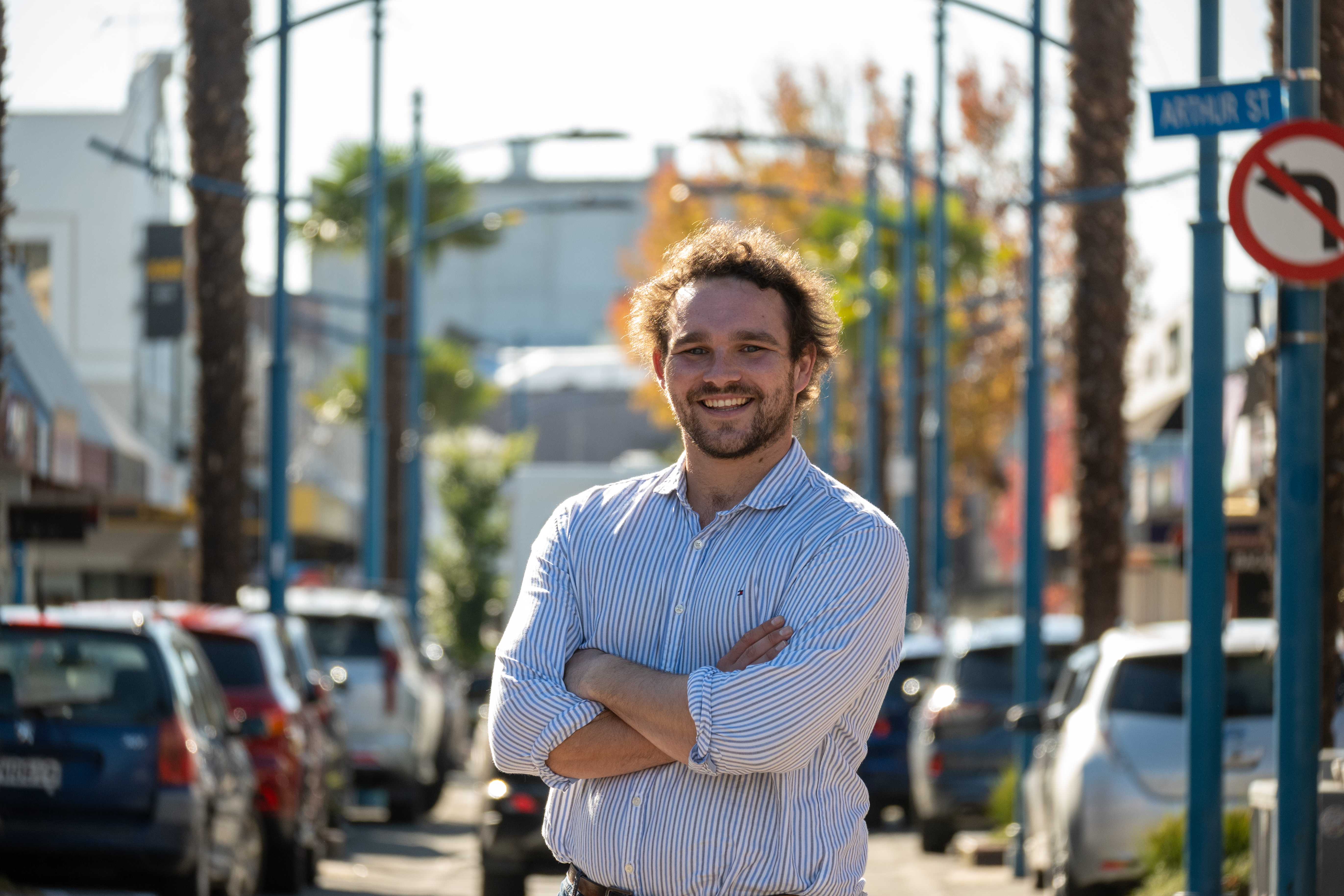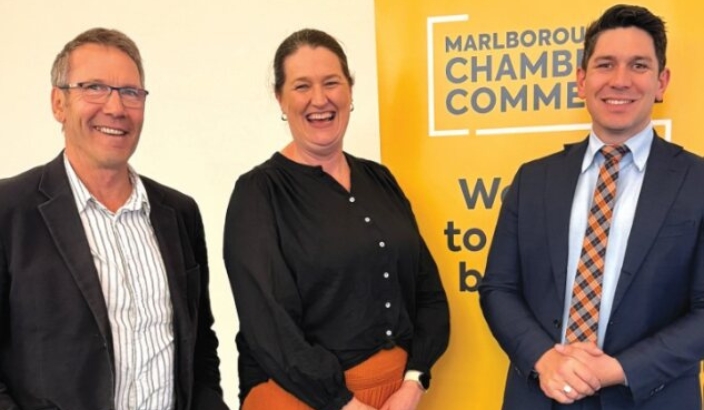Minister Meager comes to town ...


Kaikoura MP Stuart Smith, Marlborough Chamber of Commerce's Kylie Cornelius and Minister for the South Island James Meager. Photo: Supplied.
Rangitata MP James Meager, the Minister for the South Island, Youth, Hunting and Fishing, and Associate Minister for Transport recently joined Kaikoura MP Stuart Smith for a tour of the Kaikoura electorate. As part of his time in Marlborough, and after a talk with Chamber of Commerce members, he met the Marlborough Weekly’s William Woodworth for a Marlborough-focused chat.
In an initial interview you said success in the Minister for the South Island role can be assessed after a year - after eight months in office, how is it progressing?
“You’re always going to have good times and bad times in business ... but I believe we’re heading in the right direction.
“Nelson Tasman’s situation with the sawmill will impact many, so we’ve got make sure that we’re there to support people when they fall on hard times. I’ve seen this in my own electorate with the closure of freezing works and the like, but what we can do is get those people back into work through growing the economy and creating more jobs.
“We’re looking at what are we doing as a government creating better conditions for some of those businesses who are not as successful as they otherwise could be, and a lot of the time it’s energy costs - part of that a hangover from restricting oil and gas exploration, but also, when you make it hard to build renewable energy or onsite solar, that’s going to have an impact.
“Not to say that we should lose focus on the rest of the country, but if we see continued economic growth in the South Island, South Island regions performing at the top of economic dashboards, we’ll be in a good place.”
As Minister for the South Island, what is your role in supporting domestic and international tourism coming to the regional centres?
“A main job is to make sure that I have a really good relationship with Louise Upston, who has the big levers to pull in tourism.
“The South Island’s agriculture always has and will be its number one export, but tourism is a really important number two. I want to see cruise ships growing, whether Picton, Dunedin, Lyttleton, Timaru - we started off the year making some good gains in Milford Sound and giving some certainty for cruises with our round table.
“Stuart and I spent half a day this morning in Kaikōura and opportunities there through tourism, whether it’s through whale watching or ventures like Moana Skies, are huge.
“We’ve got to have a transport network where people can travel all around the South Island, not just stick to SH1, because they’re concerned about the roads.
“Particularly, with my aviation hat, making sure regional connectivity is there to maintain services in the regions, but also if we get people to New Zealand there’s no point just flying them to Auckland, Wellington and Queenstown - we’ve got to get them out travelling through places like Marlborough and Kaikōura”.
The airline loan news is close to home with Sounds Air based in the region. How can we improve regional airline connectivity, particularly for patients using the Blenheim-Christchurch route?
“Upon my last few days travelling with your MP Stuart Smith, we have been reflecting on how large our island is and how much travel it does take to get to places like this, which probably makes the week’s regional connectivity picture even more important.
“For someone in Marlborough who may need to get regular medical treatment in Christchurch, I know it is not as easy as driving four hours down the coast late at night, so being able to have access to regular, consistent flights that they can take family with them at a good price is going to be important.
“In Blenheim I was surprised to learn often you can’t land at night because of a lack of someone in the control tower so I’ve asked some questions about the reason for that.
“If you can grow passenger numbers overall, levy income is how we support the CAA regulator, so that means that we put downward pressure on those fees they’re struggling with”
Especially in Picton, there’s been ongoing uncertainty around the scope of its role in South Island transport – can they now be certain about the town’s transport infrastructure plans?
“The key is to give communities certainty - there was a bit of uncertainty and probably a little bit of misinformation around there about people saying the ferries have been canceled and they’re not coming at all.
“We’re going to have ferries arriving at the same time at a much better price, fit-for-purpose because we need to get people and goods from one side of Cook Strait to the other and ensure all the great wine, agriculture, aquaculture and tech that is produced here gets out to the rest of the world.
“We want cruises here, so we’re going to look at our biosecurity settings around biofouling. We didn’t have cruises, then people were a little bit hesitant, but it’s good for the towns and small businesses so suddenly it falls away and we realize what a difference to our local communities it is making.
“Associated road and rail infrastructure all takes investment, from people’s levies and taxes, or economic growth, and we’re of the view that we need to fund good, reliable infrastructure, it’s just a matter of how.”
Beyond wine, how do you develop and support other food and seafood sectors in Marlborough?
“Marlborough produces about 80% of our wine export, and wine brought success and investment to the region but at the same time we’re agnostic - our goal is double exports, but if you produce something new and crash hot for sale, we want to get settings in place to make that as easy for you as possible.
“That’s working with councils to make sure that local planning and consent conditions are right, regulatory systems like food product labeling, trade agreements with key markets and pressure that free trade is the right way to get our goods onto the market.
“If we do basic jobs, businesses can flourish and choose themselves. The last thing you want is someone in Wellington going ‘Marlborough has lots of wine, that’ll be the wine place, Nelson will be the aquaculture place, Southland will be the dairy place’ - we must help allow these industries to evolve naturally.”
What insights do you have as the Minister for Youth, especially in a region with one of the oldest populations?
“Young people are always going to move and explore and they’ve got the opportunity to do that, but it’s pretty personal for me because I come from South Canterbury - my electorate is one of the lowest-ranking electorates for 18 to 24 year olds because young people grow up, they see what opportunities are here, and if they don’t see potential they’ll go somewhere else.
“This is why we bang on about economic growth, because it creates opportunities for people even if they leave, to come back and to raise a family in their hometown as the job is there for them and their partner, the schools are there for their kids, the police, the hospitals and services are all there.
“Take the aviation engineering sector and its aging workforce. A lot of the work to replace, train and recruit engineers is happening here in Marlborough. What can we do to make that a valuable opportunity for young people? If they have good training from NMIT, housing and job security, they stay and aren’t tempted by the opportunities that they have to work anywhere in the world.”
The conversation with Chamber members had a real future focus – how do you hope to lay a platform for future success in Marlborough?
“You’re a really brave government who predicts what the future is going to look like. How are we to know what the world’s going to need in 20 years time? So, we aim to create the conditions where future industries can develop and thrive.
“While I’ve only had a briefing, technology like the Wellington-Blenheim autonomous flights I’m very supportive of - happily it’s my job to set the framework for testing.
“When the first flight took off from Richard Pearce Airport in Timaru, obviously not over in the US as they claim, people were hesitant about flying in a tin can in the sky. I do honestly believe it will be the future, but it’ll take a while for people to feel comfortable getting on.
“Take that approach to everything, whether it’s hydrogen, medicinal cannabis or AI, and let the opportunities fall where they fall, and you get massive benefits.
“Take hydrogen, the technology will get there at some point because they don’t have access to clean renewable electricity to generate the hydrogen, or the regulatory system for storage and export isn’t right, it’ll just happen somewhere else and someone else will get wealthy off it.
“How can we make it as easy as possible for these businesses to try to innovate, be entrepreneurs, to make a bit of money along the way, and to reinvest that back in New Zealand.”
